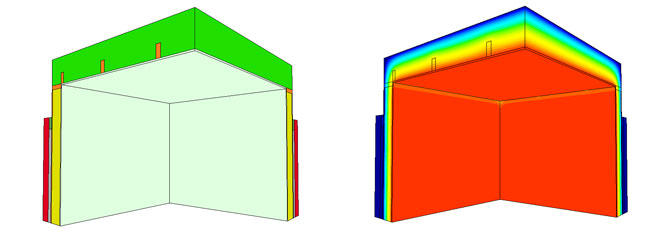- Certification >
- Agrément Certification >
- Thermal Modellers Scheme
What is Thermal Modelling?
With the latest publication of Technical Guidance Document to Part L of the Irish building regulations, it is clear that the elemental thermal performance (U-values) of the building envelope has been further improved in order to limit the primary energy use and reduce CO2 emissions for both new builds and improvements to existing dwellings.
In conjunction with increased insulation levels in the fabric of buildings, heat losses due to thermal bridging have become increasingly important. This in turn has increased the demand for such thermal bridging to be thermally modelled.
As outlined in clause 1.3.3.1 of Technical Guidance Document (TGD) Part L
- To avoid excessive heat losses and local condensation problems, reasonable care should be taken to ensure continuity of insulation and to limit local thermal bridging, e.g. around windows, doors and other wall openings, at junctions between elements and other locations. Any thermal bridge should not pose a risk of surface or interstitial condensation. Heat loss associated with thermal bridges is taken into account in calculating energy use and CO2 emissions using the DEAP methodology.
- There are a number of approaches to make reasonable provision with regard to limitation of thermal bridging, this scheme address item (iii) of clause 1.3.3.2 of TGD Part L namely 1.3.3.2 (iii) use certified details which have been assessed in accordance, and comply, with Appendix D, e.g. certified by a third party certification body such as NSAI Agrément or equivalent or certified by a member of an approved thermal modellers scheme or equivalent for all key junctions.

NSAI Thermal Modellers Scheme: Overview
The purpose of this scheme is to allow applicants to register as an approved Thermal Modeller of bridging details and junctions, for the purpose of compliance with Clause 1.3.3.2 (iii) of Technical Guidance Document Part L Conservation of Fuel and Energy - Dwellings.
The registration process is twofold:
Applicants must first demonstrate, by way of written submission, that they have a suitable level of competence in order to register as an approved Thermal Modeller.
Applicants must successfully complete 1x3D thermal bridging calculation set by NSAI Agrément and submit 5 sample 2D details as described in section 5. The Applicant will be assessed by the NSAI Agrément and registered as an approved modeller on a web based register. The modeller will be subject to audits (e.g. annual) by the approval body.
NSAI Thermal Modellers Scheme: Documents
Thermal Modeller Application Form
Guidance on application competency & Thermal Modelling validation exercises
NSAI Thermal Modellers Scheme: Overview
The purpose of this scheme is to allow applicants to register as an approved Thermal Modeller of bridging details and junctions, for the purpose of compliance with Clause 1.3.3.2 (iii) of Technical Guidance Document Part L Conservation of Fuel and Energy - Dwellings.
The registration process is twofold:
- Applicants must first demonstrate, by way of written submission, that they have a suitable level of competence in order to register as an approved Thermal Modeller.
- Applicants must successfully complete 1x3D and 2x2D thermal bridging calculation set by NSAI Agrément and submit 5 sample 2D details as described in section 5 of the "Guidance and application competency & Thermal Modelling validation exercise" document. The Applicant will be assessed by the NSAI Agrément and registered as an approved modeller on a web-based register. The modeller will be subject to audits (e.g. annual) by the approval body.
NSAI Thermal Modellers Scheme: Documents
Thermal Modeller Application Form
Guidance on application competency & Thermal Modelling validation exercises
NSAI Thermal Modellers Register
|
TM Register Number |
Name | Company | Contact Email |
|
IAB/TM/01 |
Mark Magennis | Unilin Insulation | |
| IAB/TM/02 | Andrew Lundberg | Passivate | Andrew@passivate.ie |
|
IAB/TM/04 |
Diarmuid Hynes |
O'Neill - O'Malley Ltd |
|
|
IAB/TM/05 |
James Walsh |
Low Energy Design |
info@lowenergydesign.ie |
|
IAB/TM/07 |
Andrew Dunne |
Evolusion Innovation Ltd |
|
|
IAB/TM/13 |
Shane Fenton |
Wain Morehead Architects Ltd |
|
| IAB/TM/15 | Robert Ryan | Earth Cycle Technologies | info@earthcycle.co |
| IAB/TM/18 | Charlie Kane | Mannok Build | charlie.kane@mannokbuild.com |
| IAB/TM/21 | Dónal O'Connor | Integrated Environmental Solutions Ltd | donal.oconnor@iesve.com |
| IAB/TM/23 | Derek Kirwan | K.T.E Consultants | Derek@kteconsultants.ie |
| IAB/TM/24 | Robert Kelly | Evolusion Innovation Ltd | kellyr@evolusion.net |
| IAB/TM/26 | Brendan Boyle | BEP Consulting | info@bepconsulting.ie |
| IAB/TM/34 | Dermot Redmond | MosArt Ltd | dermot.redmond@mosart.ie |
| IAB/TM/35 | Adrián Bes Benedé | Passive Dynamics Ltd | Abenede@passivedynamics.ie |
NSAI Thermal Modeller Scheme: Schedule of Fees
Our current fee structure is detailed below and the appropriate fee must accompany your application (inclusive of VAT at 23%).
Travel and expenses are not included and are charged upon completion of the initial audit.
NSAI Approved Thermal Modellers Scheme - Costs
All rates are Excl. VAT at 23%
|
Initial Registration and Assessment Fee: General Applicants |
€1250 | ||
| Initial Registration and Assessment Fee: Graduate of TU Dublin – Certificate in Thermal Modelling (15 ECTS) | €625 | ||
|
Re-Assessment Fee or Re-Audit Fee (If required) |
€625 | ||
|
Annual Audit/ Registration Fee† |
€625 | ||
† All registered Thermal Modellers will incur an Annual Audit/ Registration Fee which will fall due on the 1st January on the year following certification.
Contact Scheme Administration at sustainability@nsai.ie
